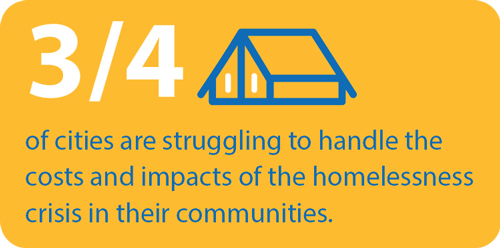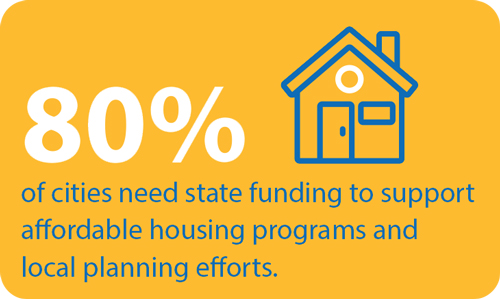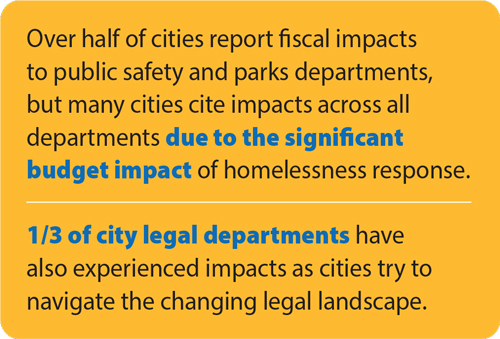Affordable housing & homelessness
Cities face two complex challenges that intertwine—lack of affordable housing and increased homelessness
In the last five years, cities have been increasingly asked to handle service areas that have historically fallen outside their traditional fiscal responsibility—homelessness and behavioral health response. Both are exacerbated by the affordable housing crisis happening across the state.
77% of cities list a lack of low income and affordable housing as a problem in their community.

Washington is missing more than 100,000 housing units for the anticipated population increase alone, to say nothing of the urgent need for workforce housing and for those at lower income levels. Cities are struggling to address the absence of affordable housing in their communities and lack resources to help the growing number of people experiencing homelessness who are sheltering in parks and on city streets.
The state should support city-tailored solutions to increase affordable housing options for all income levels and make additional investments in homelessness crisis response.
Cities need:
- New councilmanic taxing authority for affordable housing, such as an optional sales tax or real estate transaction tax.
- Support and incentives for cities that are working to expand the variety of housing in traditionally single-family neighborhoods.
- Increased state funding for homelessness crisis response.
The challenge of affordable housing is too great for local budgets alone.
Cities need state investments to address the statewide lack of affordable housing
Cities rank the following as major problems in their community:
- Availability of affordable housing
- Infrastructure conditions
Eighty percent of cities want direct state funding for housing programs to address the challenge, as well as additional local revenue options for affordable housing.

Cities need resources to handle the impacts of the homelessness crisis in their communities
Cities are increasingly finding themselves entering the homeless crisis response system not only as funders, but as service providers. We are entering uncharted waters in attempting to address the ballooning number of unsheltered people in our communities. There are no existing best practices for funding, setting up, or prioritizing individuals into managed encampments, including safe parking programs or tiny home villages. Meanwhile, the existing shelter system is at capacity and turning high numbers of unsheltered people away on a nightly basis.

“The entire city staff, organization, and community has been impacted [by homelessness response].”
– Port Angeles, WA, Population: 19,872
Washington, and the nation, are facing a crisis:
- A steadily growing unsheltered population
- Lack of shelter beds
- Lack of affordable housing
- An overly burdened system
The costs of responding to the homelessness crisis across city services are significant:
- Responding to increased police calls
- Cleaning up parks and unsanctioned public encampments
- Creating and staffing homeless outreach teams
- Managing mitigation sites
Conclusion
Cities across the state are stepping up to address both the affordable housing and homelessness crises. Cities will respond when given new options to generate revenue for affordable housing—as proven by early adoption of the new sales tax credit authority provided in 2019 by the Legislature in HB 1406. However, the challenge is too great for local budgets alone. Cities need increased state resources to address the scale of the housing crisis to cause meaningful change at the local, regional, and state levels.
Next chapter: Economic development